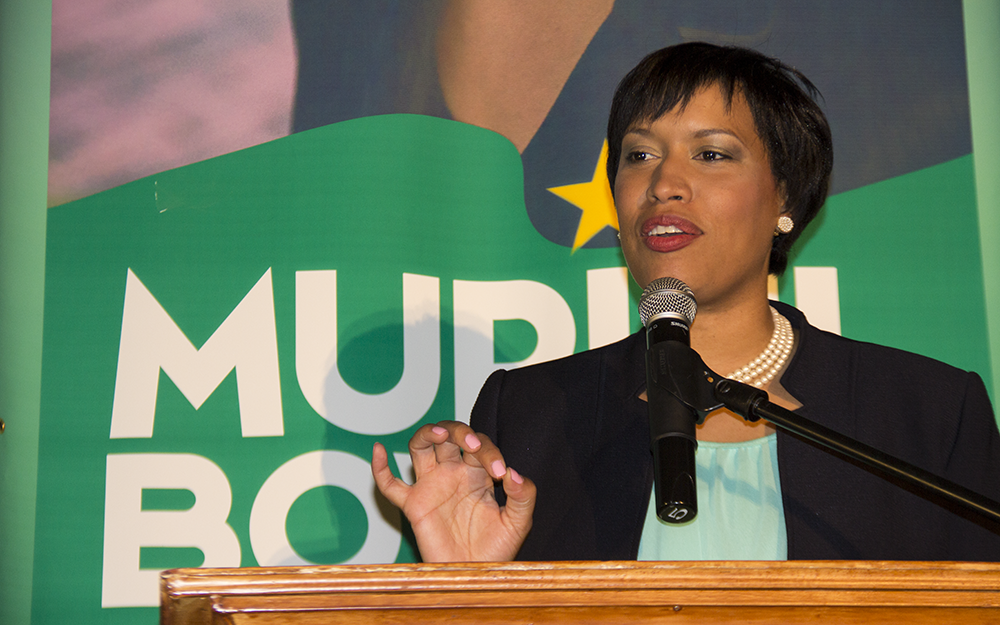
D.C. Mayor Muriel Bowser (D) released a draft of a potential D.C. constitution, which will be finalized at a convention June 17 and 18 before a citywide vote in November.
Washington, D.C. Mayor Muriel Bowser (D) released a draft of a potential District constitution May 6 that delineates the steps for elevating the nation’s capital from a federal district to a state tentatively called New Columbia.
The New Columbia Statehood Commission, a facet of the D.C. Council, will hold a convention June 17 and 18 to finalize the constitution before a citywide ballot in November to petition Congress and the incoming president to establish the District as the nation’s 51st state.
In her remarks from Lincoln Cottage, where President Abraham Lincoln drafted his Emancipation Proclamation and spent his summers during the Civil War, Bowser highlighted the plight of District residents who argue a lack of Congressional representation relegates them to a second-class status.
“We chose this site because of the significance of Lincoln being here and writing the document that freed people across the United States,” Bowser said. “It’s a fitting reminder that we are not fully free. We don’t have full democracy in the District of Columbia.”
Advocates for D.C. statehood argue that the District deserves full autonomy and representation in Congress as Washington boasts a population of 670,000, greater than either Vermont or Wyoming. D.C. residents contribute more in federal taxes than 22 states.
Under the new constitution, the city would become its own state, excluding federal land devoted to the United States Capitol, the White House, the Supreme Court Building, Union Station, the Kennedy Center, the Navy Yard and Joint Base Anacostia-Bolling.
Executive power would be vested in a governor rather than a mayor, who will nominate judges to form a judicial branch. The city’s current 13-member D.C. Council would become representatives in a new legislative body, the House of Delegates, and residents would elect two senators and a representative to serve at the federal level.
Currently, Congress has final oversight over the District’s laws and the distribution of its tax revenue as the seat of the federal government. District residents vote for a Congressional representative, currently Eleanor Holmes Norton (D), who sits in the House of Representatives but does not vote on legislation.
Congress has occasionally used its legal authority in Washington, D.C., to turn the District into a proxy battleground over politically divisive issues. Earlier this year Congress changed budget allocations to prevent the full legalization and taxation of recreational marijuana, despite 64 percent popular support in a referendum vote on the issue.
Kotryna Jukneviciute (COL ’18), executive officer of the Georgetown University Student Association senate, said D.C. statehood should be addressed with a bipartisan approach.
“It’s ultimately a civil rights issue. You have 700,000 people in the District of Columbia who don’t have a voice,” Jukneviciute said. “We have people of very different political opinions in our office, and what’s really important to understand is that everyone in the office is behind this. Regardless of political views, we try to take the politics out of such a controversial issue and try to make it not as controversial, because it’s ultimately people having a voice and a say in what goes on.”
The push for statehood has encountered resistance from conservatives, including former presidential contender Governor John Kasich (R-Ohio), who said D.C. statehood would skew the balance of political parties.
“What it really gets down to, if you want to be honest, is because they know that’s just more votes in the Democratic Party,” Kasich said in an interview with The Washington Post.
Democratic presidential candidates former Secretary of State Hillary Clinton and Sen. Bernie Sanders (I-Vt.) have both expressed support for D.C. statehood. Sanders was one of 16 co-sponsors of the New Columbia Admission Action, a bill initiated last June to make the District a state.
Clinton penned an editorial for the Washington Informer published May 11 demonstrating solidarity for statehood.
“As president, I will be a vocal champion for D.C. statehood,” Clinton wrote. “Washingtonians are Americans, too, and it’s time they had a say in their own status.”
Presumptive Republican presidential nominee Donald Trump has not yet taken a definitive stance on the issue, though he stressed the difficulties present in the push for statehood.
“I think statehood is a tough thing for D.C.,” Trump said to The Washington Post. “I don’t have a position on it yet. I’d like to study it.”
Cheryl Liu (COL ’19), secretary of GUSA’s D.C. statehood body, a branch formed this year, emphasized the need to consolidate the constitution in order to make statehood a reality, regardless of the presidential election outcome.
“From the point of view of the federal relations office, we’re much more focused on the issue at a local level,” Liu said. “While we obviously do follow national politics and pay close attention to what candidates are saying, that’s not really our focus, and regardless of who is elected in November, if the referendum passes we hope that we can present that package to the next Congress.”
Liu highlighted the relevance of the issue to Georgetown and the opportunity it provides to students to become actively involved in the wider D.C. community.
“We talk a lot about being a school about social justice and getting involved in the community, and I think that as Georgetown students, we are in a very good position to advocate for the rights of the people around us,” Liu said. “I think it’s only right that we as a school very focused on social justice take this issue under our wing.”




















